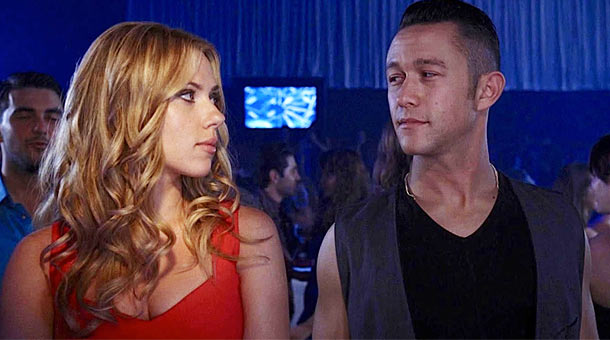
“During the movie’s lean 90 minutes, Martello meets two women who pull him in conflicting directions. The first is Barbara Sugarman, whom Scarlett Johansson (Hitchcock) plays with a brilliant New Jersey snarl.” —Dean Essner
Joseph Gordon-Levitt’s (Lincoln) Don Jon, a critique of Generation Y, examines the way technology fuels and obfuscates our sexual urges. There’s merit in such a premise. However, Gordon-Levitt, only a few years too old to be considered a true millennial, directs this movie as if he’s an old man who eschews the ‘computer machine’ — the type of person who gets his news from Thomas Friedman only to sigh heavily every time the word ‘interconnectedness’ is mentioned.
The plot is fairly simple: Gordon-Levitt, as Jon “Don Jon” Martello Jr., is a horny simpleton who only cares about “his body, his pad, his ride, his family, his church, his boys, his girls, and his porn.” Especially his porn. A recurring shot in Don Jon features a glassy-eyed Gordon-Levitt at his laptop flipping through money shot clips from low-budget stag films.
During the movie’s lean 90 minutes, Martello meets two women who pull him in conflicting directions. The first is Barbara Sugarman, whom Scarlett Johansson (Hitchcock) plays with a brilliant New Jersey snarl. The second is Julianne Moore’s (The English Teacher) Esther, the older, more introspective of the two. Esther treats Martello’s pornography obsession as a legitimate addiction that can be remedied with love and tender affection. Sugarman, whose fetish for fairy-tale romance movies resembles Martello’s relationship with scantily clad women on a porn site, is less forgiving once she learns of his dirty habits. The discrepancy between the two female leads is interesting, albeit a bit trite. Of course the less-sexualized Moore with more years under her belt will aid Don Jon’s transition into loving reality more than fantasy. Nonetheless, the way it all unfolds is engrossing.
As far as potential goes, Don Jon could have been great. Instead, bogged down by dim-witted dialogue and clunky, unremarkable characters, it settles for middling. There are moments, though, in which the movie comments intelligently on technology by portraying an infatuation with screens: Martello with his porn, his sister (Brie Larson, The Spectacular Now) with her cellphone, his father (a boisterous Tony Danza, Aftermath) with his football games, Sugarman with her movies. Yet only Martello actively acknowledges his obsession as a legitimate vice, turning the other characters’ ignorance into a scary, dystopian-esque theme that Gordon-Levitt’s film teases in parts.
One scene that sums this up well occurs early in the movie with the entire Martello family eating dinner. Suddenly, a Carl’s Jr. commercial featuring a girl in a tight bikini flashes onscreen nearby. Gordon-Levitt focuses the whole sequence around this ad, the sound from the TV infiltrating the table chatter in a style reminiscent of director Jean Luc-Godard’s fidgety new-wave classic Une femme est une femme. All eyes are fixated on the tube. No one is mentally present. Thomas Friedman would perhaps call this “interconnectedness.” But Don Jon is too obsessed with its titular character’s hedonistic rise and fall to decide whether it’s a good or bad thing.



